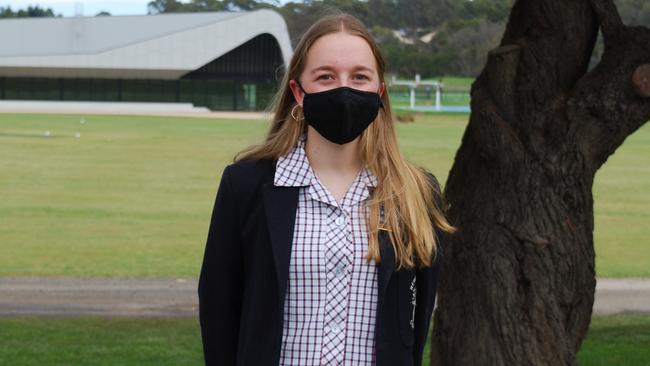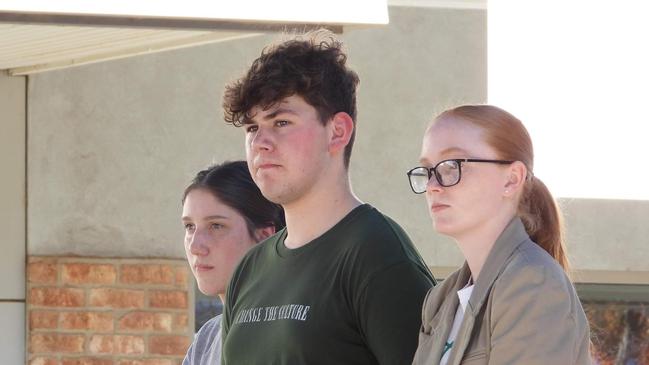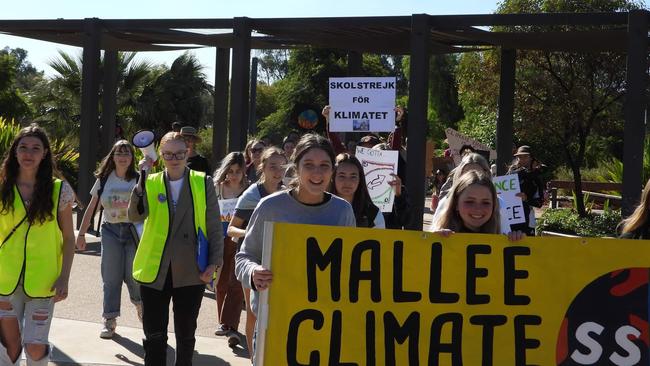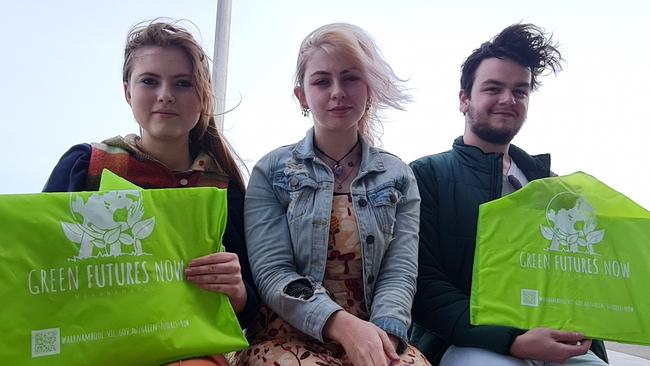Victoria’s future climate change leaders reveal their thoughts
They might be young but that won’t stop our climate change heroes of tomorrow from fighting to improve our communities today. See our future leaders here.
Environment
Don't miss out on the headlines from Environment. Followed categories will be added to My News.
There is no doubt climate change threatens to impact our young generations unless urgent action is taken.
For many who are still too young to vote, it can be difficult to have their voices heard on the issue — particularly by those in power.
But more and more young, school-aged children and teens are doing what they can to not only raise awareness of environmental issues but be actively involved in finding solutions and addressing the problem.
We spoke to some climate warriors from across the state to find out what drove them to take up the cause and how they feel about the future.

Phillip Island
Rachel Barker - Newhaven College Year 12 environment captain
What makes you a climate change leader?
Always looking at ways we as a school can do better, whether that be of waste disposal, energy usage, raising awareness, and the list goes on. If something is or isn’t working, we relay that information or implement any change needed.
Why are environmental issues important to you?
Essentially, we as young adults are the ones who will see the widespread impacts of human activity on the planet, and if we don’t start raising awareness now, then it is literally going to be too late.
What systems have been introduced at the school to reduce waste?
A clearly labelled four bin system — organic waste, recycling, paper, and general waste. I think getting into habits of disposing waste into different bins at school can help students implement change in their homes as well. It is not hard and makes a big difference. We have large compost bins that students are encouraged to get involved in. The ‘why’ behind initiative is important too and helps people feel more compelled to get involved and do the right thing. When food scraps are sent to landfill, they decompose to produce methane, a greenhouse gas with more than 20 times the global warming capacity of carbon dioxide.
What do you think needs to change to preserve the environment?
People’s attitude and of course changes in policies. Climate change and environmental issues are not a problem for a small group of people who care. It will inevitably start to affect more and more people, and we as the younger generation will see the brunt of that. I read a statistic recently stating that scientific analysis has found around 85 per cent of the world’s population has been impacted by climate change.

Mildura
Ella Beard and Conor Pall
When Mildura Senior College Year 11 student Ella Beard, 17, and Year 12 student Conor Pall, 18, organised a School Strike for Climate event earlier this year, they were expecting some pushback from sections of the community.
However, they were not prepared for the level of abuse — and especially personal attacks — they received on social media platforms.
“When (the comments) got vulgar and were actually personal attacks, I think that’s when we were like ‘hold on’,” Conor says.
“We’re allowed to stand up for our right to protest. We’re allowed to create a movement of change.
“It didn’t take a toll on us, but we were just like ‘wow, these are adults’.”
The pair invited those who had opposed their views to attend the strike and have a conversation face-to-face.
“To our surprise, no one showed up,” Conor said.
The Sunraysia region is renowned as one of Australia’s foodbowls and with its weather extremes — particularly the heat of summer — make it particularly vulnerable to the impacts of climate change.
Conor says his perspective on the issue changed after he completed an exchange to Italy in 2020.
“The school I went to was a scientific school and they had a massive focus on renewables and research into renewable energy — they were really future driven,” he said.

“It was a reflective moment. It was like ‘why the heck isn’t this issue being talked about more’, especially in Mildura.
“It’s something that is going to affect our future and especially our region having such a big production of citrus and other produce.
“For an area that relies so heavily on the Murray River we are so prone to the effects of climate change already,” Ella said.
The pair say every step individuals can make in changing their habits can impact positively, however there needed to be more impetus from the Federal Government to lead on the issue.
“Continuing to build coal mines and other forms of non-renewable energy isn’t going to put Australia into the future,” Ella said.
“We’re really lagging behind, especially looking at other countries.
“It starts with the government. Obviously individuals can make as many changes as they can, that’s fantastic, it all counts towards something but we also need big changes from the leaders of our country.”
Conor said one tactic often used by climate sceptic was to dismiss the small changes individuals could make.
“Saying small things don’t matter is not helpful and it’s not productive,” he said.
“Doing things in our LGA matter. Getting a reusable coffee cup instead of new plastic cup every day. If everyone did that it would create a ripple effect of change. No matter how small the change is.”

Warrnambool
Maiya Steele, 18, Tully Farrington, 17 and Joe Johnstone, 18, are quite literally taking the lead on climate issues for the south-west region.
The trio are members of Green Futures Now, which is an environmental leadership program for young people aged between 12-25.
Run by the Warrnambool City Council in conjunction with the Warrnambool Youth Council, and with support from the Department of Environment, Land, Water and Planning, the program gives young people the opportunity to build their knowledge and actively participate in programs and events to help address climate change.
“It’s to raise awareness and be proactive about this issue, whether it’s young people or older people and give them an insight into how they can help,” Tully said.
“It provides insight into the various community groups that are present around the Warrnambool region and what they do in order to help revegetate, maintain and sustain environments around the Warrnambool region,” Joe added.
Maiya said it was important to be actively involved in helping mitigate, adapt and respond to climate change in the region.
Tully and Joe are in Year 11 and 12 at Warrnambool College while Maiya works at the college — where she graduated last year — while studying at TAFE.
“For young people, we feel like it’s time for us to take the lead and try to do what we can before it’s too late,” Tully said.
“There’s certain ease to not caring where it takes more of a dedication and actual personal involvement to feel strongly passionate towards caring for the environment,” Joe said.
“It’s not that much of a hassle, but it’s more than a hassle than most people are willing to sacrifice.”
Getting the Federal Government to take more responsibility on climate action was important, with the trio especially critical of the efforts of Prime Minister Scott Morrison.
“It’s humiliating for us as a country to be seen as a country that doesn’t care about climate change,” Tully said.
“Australia needs to up its game, especially Scott Morrison. He’s being a bit of a puppet to the coal industry and a lot of those big corporations.”
Joe said Australia’s diverse ecosystem made it particularly vulnerable to the impacts of climate change.
“It’s a huge spit in the face to see it (the ecosystem) all really mistreated and not cared about like is should be,” he said.
Originally published as Victoria’s future climate change leaders reveal their thoughts




